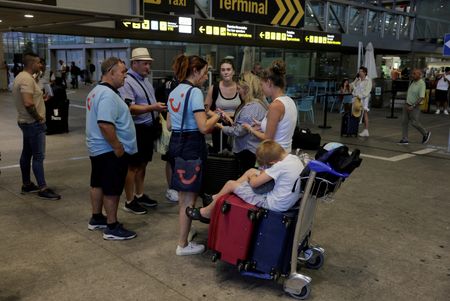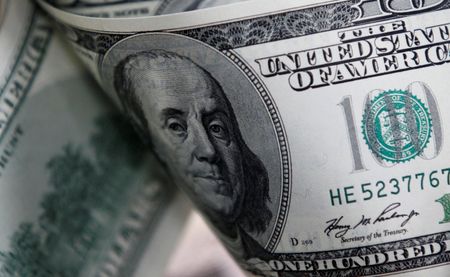By Joanna Plucinska
LONDON (Reuters) -European airlines are set to report first-quarter results in the coming weeks, offering outlooks for the lucrative travel season amidst growing worries that economic uncertainty could slow demand and threaten earnings.
That comes after the European Travel Commission noted in a study published Wednesday that Europeans are making fewer travel plans for this summer on the continent, particularly among the Gen Z demographic.
“For European airlines, the key risk is to demand and unit revenues, whilst an area of upside is from lower fuel prices,” Ruairi Cullinane, an analyst at RBC, said in a note.
That marks the first sign of a potential slowdown in what was seen as unrelenting travel demand after the COVID pandemic subsided, leading to a strong return to profit for much of the airline business.
Global economic instability triggered by U.S. President Donald Trump’s tariff threats are leading to worsening European recession fears, with many worrying that consumer and travel spending could suffer as a result.
Analysts say while the risk of a shift in demand was present, sizeable drop-offs in demand had yet to be noted.
“Demand indicators are not all flashing red,” Cullinane told Reuters.
Lufthansa reports on Tuesday and Air France-KLM reports on Wednesday, with analysts expecting some backlash to an outlook based on a later Easter date pushing a key earnings period back in the financial year.
While airlines aren’t seeing clear negative outcomes yet, about 10% fewer Gen Z travellers are planning trips between April and September of 2025 compared to last year, the survey showed.
Some argue Gen Z are more sensitive to higher costs, but the travel commission said that Gen Z travellers who do book trips often have higher budgets than other age groups.
“Over the past few years, Gen Z has generally been more cautious with their travel intentions, planning fewer trips than their older counterparts,” said Eduardo Santander, Chief Executive of the European Travel Commission, adding that more Europeans were travelling for specific events.
“We’ve also noticed a slight decline in pleasure trips.”
Overall planned trips for the time period down 3% for all Europeans, with leisure travel in particular set to see an 8% drop compared to 2024.
Ryanair had warned that they may see modest ticket price growth this summer but could fail to recover losses from last year, while Air France-KLM said it would consider cutting economy fares to boost transatlantic travel.
In particular, Europeans are already booking fewer trips to the United States since U.S. President Donald Trump entered office in January this year over fears tied to political risk and possible immigration challenges.
A senior European airline industry source said there had been some wavering in international demand immediately following the imposition of sweeping tariffs by Trump in early April, with some potential passengers holding back until the political uncertainty settled down.
But analysts told Reuters they weren’t overly concerned on airline results just yet. Carriers are keeping capacity growth moderated with demand “robust enough” to maintain reasonable yields for airlines, Stephen Furlong an equity research analyst at Davy said.
Still, investors were “keenly focused” on possible spillover from North American ticket softness into the intra-European market, Dudley Shanley, research analyst at Goodbody, said.
COOLER CLIMES
Extreme weather and rising temperatures are also driving a shift in demand, with an 8% drop in interest to summer travel to the south Mediterranean compared to last year. Still, Italy and Spain remain as among the most popular destinations in the region among Europeans.
Some 28% of Europe’s tourists are more keen to travel to milder climates in an effort to avoid spiralling temperatures, with interest in travel to Northern, central and eastern Europe rising year-on-year, the study showed.
“With climate change impacting travel decisions and patterns, tourism businesses in warmer areas should promote indoor activities during warmer hours and focus their marketing and sales plans on milder shoulder seasons,” the survey said.
(Additional reporting by Tim Hepher; editing by David Evans)











